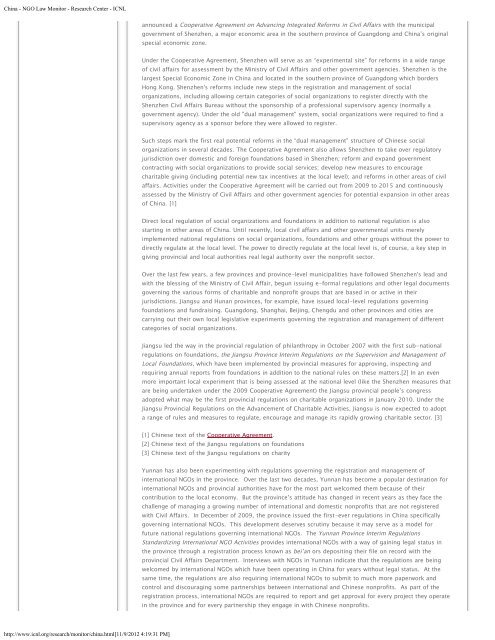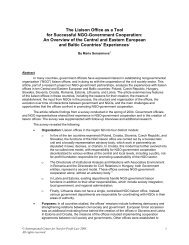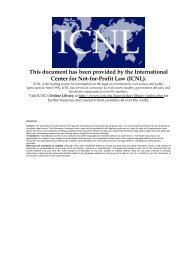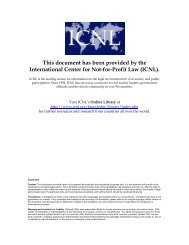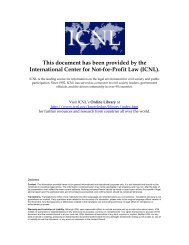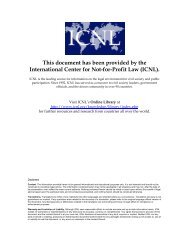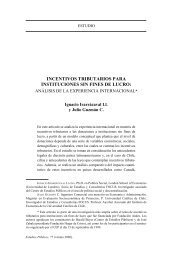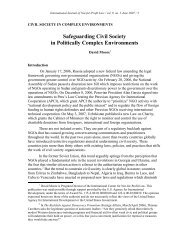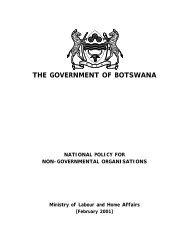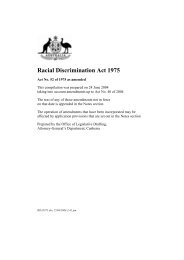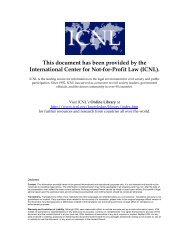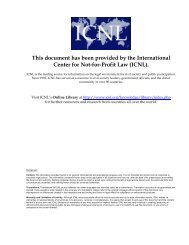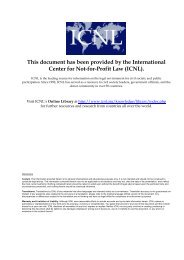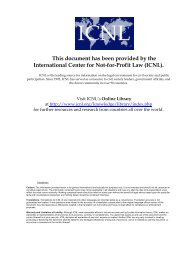NGO Law Monitor: China RESEARCH CENTER - The International ...
NGO Law Monitor: China RESEARCH CENTER - The International ...
NGO Law Monitor: China RESEARCH CENTER - The International ...
You also want an ePaper? Increase the reach of your titles
YUMPU automatically turns print PDFs into web optimized ePapers that Google loves.
<strong>China</strong> - <strong>NGO</strong> <strong>Law</strong> <strong>Monitor</strong> - Research Center - ICNL<br />
http://www.icnl.org/research/monitor/china.html[11/9/2012 4:19:31 PM]<br />
announced a Cooperative Agreement on Advancing Integrated Reforms in Civil Affairs with the municipal<br />
government of Shenzhen, a major economic area in the southern province of Guangdong and <strong>China</strong>’s original<br />
special economic zone.<br />
Under the Cooperative Agreement, Shenzhen will serve as an “experimental site” for reforms in a wide range<br />
of civil affairs for assessment by the Ministry of Civil Affairs and other government agencies. Shenzhen is the<br />
largest Special Economic Zone in <strong>China</strong> and located in the southern province of Guangdong which borders<br />
Hong Kong. Shenzhen's reforms include new steps in the registration and management of social<br />
organizations, including allowing certain categories of social organizations to register directly with the<br />
Shenzhen Civil Affairs Bureau without the sponsorship of a professional supervisory agency (normally a<br />
government agency). Under the old "dual management" system, social organizations were required to find a<br />
supervisory agency as a sponsor before they were allowed to register.<br />
Such steps mark the first real potential reforms in the “dual management” structure of Chinese social<br />
organizations in several decades. <strong>The</strong> Cooperative Agreement also allows Shenzhen to take over regulatory<br />
jurisdiction over domestic and foreign foundations based in Shenzhen; reform and expand government<br />
contracting with social organizations to provide social services; develop new measures to encourage<br />
charitable giving (including potential new tax incentives at the local level); and reforms in other areas of civil<br />
affairs. Activities under the Cooperative Agreement will be carried out from 2009 to 2015 and continuously<br />
assessed by the Ministry of Civil Affairs and other government agencies for potential expansion in other areas<br />
of <strong>China</strong>. [1]<br />
Direct local regulation of social organizations and foundations in addition to national regulation is also<br />
starting in other areas of <strong>China</strong>. Until recently, local civil affairs and other governmental units merely<br />
implemented national regulations on social organizations, foundations and other groups without the power to<br />
directly regulate at the local level. <strong>The</strong> power to directly regulate at the local level is, of course, a key step in<br />
giving provincial and local authorities real legal authority over the nonprofit sector.<br />
Over the last few years, a few provinces and province-level municipalities have followed Shenzhen's lead and<br />
with the blessing of the Ministry of Civil Affair, begun issuing e-formal regulations and other legal documents<br />
governing the various forms of charitable and nonprofit groups that are based in or active in their<br />
jurisdictions. Jiangsu and Hunan provinces, for example, have issued local-level regulations governing<br />
foundations and fundraising. Guangdong, Shanghai, Beijing, Chengdu and other provinces and cities are<br />
carrying out their own local legislative experiments governing the registration and management of different<br />
categories of social organizations.<br />
Jiangsu led the way in the provincial regulation of philanthropy in October 2007 with the first sub-national<br />
regulations on foundations, the Jiangsu Province Interim Regulations on the Supervision and Management of<br />
Local Foundations, which have been implemented by provincial measures for approving, inspecting and<br />
requiring annual reports from foundations in addition to the national rules on these matters.[2] In an even<br />
more important local experiment that is being assessed at the national level (like the Shenzhen measures that<br />
are being undertaken under the 2009 Cooperative Agreement) the Jiangsu provincial people’s congress<br />
adopted what may be the first provincial regulations on charitable organizations in January 2010. Under the<br />
Jiangsu Provincial Regulations on the Advancement of Charitable Activities, Jiangsu is now expected to adopt<br />
a range of rules and measures to regulate, encourage and manage its rapidly growing charitable sector. [3]<br />
[1] Chinese text of the Cooperative Agreement.<br />
[2] Chinese text of the Jiangsu regulations on foundations<br />
[3] Chinese text of the Jiangsu regulations on charity<br />
Yunnan has also been experimenting with regulations governing the registration and management of<br />
international <strong>NGO</strong>s in the province. Over the last two decades, Yunnan has become a popular destination for<br />
international <strong>NGO</strong>s and provincial authorities have for the most part welcomed them because of their<br />
contribution to the local economy. But the province’s attitude has changed in recent years as they face the<br />
challenge of managing a growing number of international and domestic nonprofits that are not registered<br />
with Civil Affairs. In December of 2009, the province issued the first-ever regulations in <strong>China</strong> specifically<br />
governing international <strong>NGO</strong>s. This development deserves scrutiny because it may serve as a model for<br />
future national regulations governing international <strong>NGO</strong>s. <strong>The</strong> Yunnan Province Interim Regulations<br />
Standardizing <strong>International</strong> <strong>NGO</strong> Activities provides international <strong>NGO</strong>s with a way of gaining legal status in<br />
the province through a registration process known as bei’an ors depositing their file on record with the<br />
provincial Civil Affairs Department. Interviews with <strong>NGO</strong>s in Yunnan indicate that the regulations are being<br />
welcomed by international <strong>NGO</strong>s which have been operating in <strong>China</strong> for years without legal status. At the<br />
same time, the regulations are also requiring international <strong>NGO</strong>s to submit to much more paperwork and<br />
control and discouraging some partnerships between international and Chinese nonprofits. As part of the<br />
registration process, international <strong>NGO</strong>s are required to report and get approval for every project they operate<br />
in the province and for every partnership they engage in with Chinese nonprofits.


